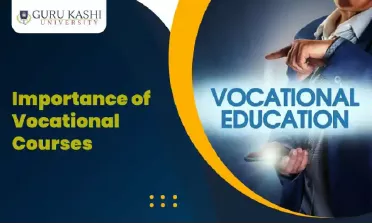Importance of Vocational Courses
- Home
- Blog Detail
- 13 Jul 2024
In recent years, there has been a change in the way that businesses approach hiring in the labor market. Recruiters are increasingly interested in hiring professionals who possess the necessary practical skills rather than professionals who have graduated from programs that prioritize teaching students academic information. This is because graduates lack the necessary proficiency to assume their roles and duties, even after gaining theoretical knowledge of the sector and its operations. Despite not having received the necessary training to function in real-world settings, they might have a conceptual grasp of the subject matter. On the other hand, graduates who participate in vocational training while pursuing their degrees have the know-how and practical abilities necessary to blend in with the industrial setting. Having seen this trend, academic institutions and universities.
Bachelor of Vocation (B.Voc)
The Bachelor of Vocation program, also abbreviated as B.Voc, is a three-year undergraduate degree program designed to equip students with real-world experience and a practical grasp of their subject of study, thereby preparing them for industry. The Government of India itself is endorsing these courses, and they have been approved and accredited by several official regulatory authorities for education, including the NAAC, AICTE, UGC, and AIU. The value of these courses is comparable to that of other bachelor's degrees, and students who complete their B.Voc are qualified for employment in a variety of public and commercial sectors. If students pursue a B.Voc course, they also have the option of applying for state and central exams such as UPSC, SSC, IBPS, and CPO. Students who complete their B.Voc courses and choose to pursue further education can choose between M.Voc and Ph.D. programs.
Key Highlights
The decision to pursue B.Voc courses has several benefits. A few of them are covered in the section below.
-
The University Grants Commission (UGC) has authorized these courses, guaranteeing that the curriculum is created by industry standards and that the students obtain a high caliber of education.
- The curriculum of B.Voc courses includes several entry and exit points to give students flexibility in their study. These points are available for students to use in order to tailor their learning schedule to their preferences. Students receive a diploma after one full year of study, an advanced diploma after two years, and a degree after completing the three-year course in its entirety. Students receive a certificate after completing six months of study.
- B. Voc. Students' financial stress is lessened because courses are far less expensive than traditional courses.
- A deeper comprehension of the disciplines is attained through practical projects, laboratory instruction, and a variety of internship options offered by vocational courses.
- These courses have a strong emphasis on helping students develop their personalities, communication skills, and entrepreneurial abilities in addition to their academic knowledge.
Conclusion
B.Voc courses are a better option for students who want to work in industries at entry-level jobs since they give them the necessary skills to pursue a career in the field of their choice.
.webp)
